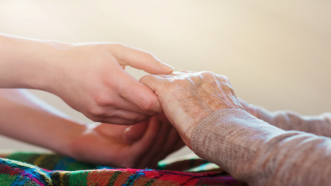Many family caregivers use digital health tools, but they remain complex and confusing to some patients, especially the elderly.
A new study by Parks Associates has concluded that many home caregivers use digital health devices to support them in helping their loved ones, including electronic panic buttons and smart watches with integrated panic buttons. They seem to be doing so, at least in part, because the elderly aren’t too likely to go online for medical help.
While the elderly and chronically ill aren’t using digital health devices in large numbers, 41% of caregivers find them helpful in staying on top of a loved one’s care needs, Parks Associates concluded. That number includes the 8% who use web resources to help coordinate a loved one’s care.
Parks Associates, which analyzed a large number of data sources to create their report— including a Q2 ‘14 survey of 10,000 U.S. broadband households looking at health and wellness behaviors—also found that of U.S. broadband households, 22% have a head of household that already cares for a family member. Among these caregivers, the top concern they have is that their loved one might fall, which explains why the panic button and watch with panic button are popular options.
Lack of health literacy lowers digital health adoption
While seeing caregivers lean on digital health tools is a good step forward, more work is needed to bring patients into this world. Caregivers are becoming immersed in digital health solutions, in part, because the elderly people they care for aren’t likely to start using solutions anytime soon.
In fact, a University of Michigan study recently found that many older Americans (age 65+) have low health literacy rates. Less than one-third of U.S. seniors take advantage of health content online.
Meanwhile, among those with low health literacy rates, the number who dig up health information on the web falls precipitously, to less than 10%, researchers concluded. These low-literacy patients are less likely to turn to the Internet for any purpose, and if they do, it’s very unlikely that they’ll search for health information, the U of M researchers said.
Making digital tech accessible
As many readers know first-hand, vendors and other digital health industry stakeholders are hard at work developing tools that will be usable for everyone, including those elderly patients who don’t feel up to learning new systems.
But it’s worth bearing in mind that while most see digital health’s potential, health leaders are still focused primarily on improving EMR usability for clinicians. For example, the AMA recently released a report outlining what the group sees as the top EMR usability priorities, focused of course on improving physicians’ experience.
However, as connected health/mHealth/digital health explodes this year, releasing products that both the ailing family member and caregiver can use will become a priority. After all, without cooperative use between care teams, such tools lose much of their capacity for improving health outcomes.
Ultimately, while creating usable EMRs will remain close to the top of health IT vendors’ to-do list, expect to see increasingly user-friendly products appear in the digital health marketplace. It’s only a matter of time.
Anne Zieger is a veteran journalist who’s been covering the U.S. healthcare scene for over 25 years. You can follow Anne on Twitter @ziegerhealth.
The nuviun blog is intended to contribute to discussion and stimulate debate on important issues in global digital health. The views are solely those of the author.

.jpg)



